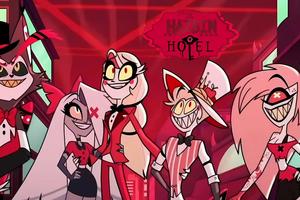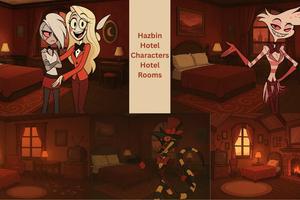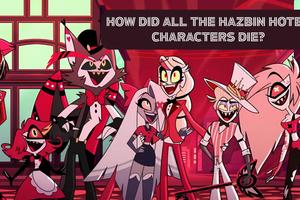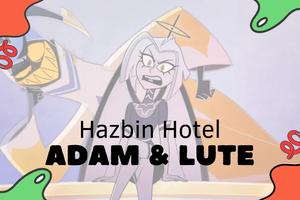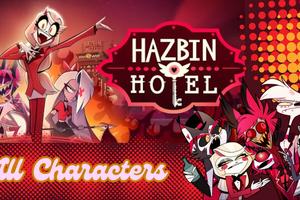Lute's Quotes in Hazbin Hotel: Complete Analysis & Character Insights

Key Takeaways
Essential insights to remember
Lute's quotes reveal her as a dutiful yet prejudiced Exorcist with deep loyalty to Heaven's hierarchy.
Her dialogue showcases a progression from obedient second-in-command to assertive leader following Adam's death.
Lute's quotes consistently emphasize her belief in the irredeemability of sinners, directly opposing Charlie's mission.
Her speech patterns and word choices demonstrate her tactical mindset and calculated approach to maintaining Heaven's order.
The emotional vulnerability in her quotes during Adam's death scene provides a rare glimpse into her deeper character.
Introduction
In the neon-lit underworld of Hazbin Hotel, few characters embody celestial righteousness with such unwavering conviction as Lute, the formidable Exorcist whose cutting dialogue reveals layers of complexity beneath her stoic exterior.
🔍 As Adam's loyal second-in-command and eventual successor (with some rumours of relation between Adam and Lute), Lute's quotes serve as a fascinating window into Heaven's perspective on Hell's denizens. Her sharp-tongued exchanges with Charlie Morningstar, Princess of Hell, and other characters illuminate the ideological chasm between redemption and damnation that forms the show's central conflict.
Through her limited but impactful screen time across the three episodes of Season 1, Lute's dialogue evolves from dutiful reporting to authoritative command, punctuated by moments of genuine emotional vulnerability.
This comprehensive analysis delves into every recorded utterance from this enigmatic antagonist, exploring how her words illuminate her character arc, belief system, and pivotal role in the celestial hierarchy of the Hazbin Hotel universe.
Whether reporting extermination statistics or delivering ultimatums to Hell's royalty, Lute's lines consistently reflect her unwavering dedication to Heaven's cause—even when that cause appears increasingly questionable.
Lute's Character Background in Hazbin Hotel
The intimidating Exorcist known as Lute emerges as a pivotal antagonist in the Hazbin Hotel universe, serving as both Adam's trusted lieutenant and the embodiment of Heaven's uncompromising stance toward sinners. 👼 Her character design—featuring the distinctive Exorcist mask and imposing stature—visually reinforces the cold efficiency revealed through her dialogue.
Unlike other angelic entities in the show who express various degrees of uncertainty about Heaven's policies, Lute's quotes consistently demonstrate unwavering conviction in the righteousness of extermination.
Position in Heaven's Hierarchy
As Adam's right hand, Lute occupies a position of significant authority among the Exorcists, a status reflected in her commanding tone when addressing subordinates and her respectful yet confident manner when speaking to superiors. Her dialogue with Adam suggests a professional relationship built on mutual respect and shared purpose, while her interactions with higher powers like Sera reveal a more deferential aspect of her character.
This quote demonstrates her function as not just a follower but occasionally a voice of restraint for the impulsive Adam, highlighting her tactical awareness and political savvy within Heaven's strict hierarchical structure.
Key Character Traits Revealed Through Dialogue
Lute's vernacular is marked by clinical precision when discussing extermination statistics ("Got a good 275 this year, sir"), juxtaposed with emotional intensity when her worldview is challenged ("They had their chance and they earned damnation"). This linguistic duality reflects her compartmentalized psychology—capable of both detached professionalism and passionate fervor.
The lexical choices in Lute's dialogue—particularly her emphasis on words like "earned," "destroy," and "filth"—create a semantic field of judgment and punishment that reflects her internalized belief in the moral rectitude of Heaven's extermination policy. This linguistic pattern establishes her as the antithesis to Charlie's redemptive philosophy, positioning her as both an ideological and physical antagonist to the hotel's mission of rehabilitation.
Lute's Most Revealing Quotes from "Overture"
The inaugural episode of Hazbin Hotel introduces Lute through a series of terse yet telling exchanges that immediately establish her as a formidable embodiment of Heaven's unforgiving stance toward Hell's inhabitants. 📊 Her debut dialogue occurs during a formal report to Adam, where she dispassionately announces her extermination statistics with unmistakable pride.
Extermination Statistics and Professional Pride
This numerically precise statement reveals multiple facets of Lute's character simultaneously. The quantification of kills demonstrates her methodical approach to extermination, while the qualifier "good" suggests she views these numbers as performance metrics rather than lives extinguished. The casual delivery of this statistic indicates how normalized the annual purge has become for her—genocide reduced to a routine performance review.
Ideological Confrontation with Charlie
When confronted by Charlie Morningstar's suggestion that demons and angels share similarities, Lute's response crystallizes her dogmatic worldview:
The emphatic stress on "earned" reveals Lute's fundamental belief in a meritocratic afterlife system—one where damnation is not merely a consequence but a deserved punishment. This lexical choice reflects a philosophical stance that completely negates the possibility of redemption, directly contradicting Charlie's rehabilitative mission. The declarative structure of her statement ("They are not the same") leaves no room for nuance or exception, illustrating her binary perspective on morality.
Angelic Infallibility and Doubt
Perhaps most intriguing is Lute's assertion of angelic perfection:
The notable pause between these two statements introduces a subtle undercurrent of complexity. While her words affirm unwavering faith in Heaven's infallibility, the hesitation and subsequent self-reassurance ("I know that") hint at the potential for doubt—a hairline fracture in her otherwise impenetrable certitude. This momentary vulnerability adds depth to what could otherwise be a one-dimensional antagonist.
Contempt for Hellborn Demons
Lute's exchange with Charlie escalates to reveal her disdain for Hellborn demons:
The emphasis on "you're" and "little" transforms this from mere information delivery to psychological warfare, revealing Lute's capacity for cruelty. Her question—"How does that feel?"—demonstrates a deliberate attempt to inflict emotional damage, highlighting that her antagonism extends beyond physical extermination to psychological dominance. This quote also reveals her resentment toward what she perceives as preferential treatment for Hellborn demons, suggesting a rigidity that cannot accommodate exceptions to Heaven's judgment.
Lute's Confrontational Quotes in "Welcome to Heaven"
The episode "Welcome to Heaven" expands Lute's character through a series of increasingly confrontational exchanges that reveal her deep-seated prejudice against demons and her complex relationship with Heaven's authority structure. 🏛️ Her initial shock at seeing Charlie and Vaggie in the celestial realm manifests as indignant disbelief, setting the tone for her subsequent interactions.
Territorial Outrage
This dual-question structure reveals Lute's perception of Heaven as an exclusive domain that has been violated by Charlie's presence. The repetition of "here" emphasizes her territorial mindset, while the incredulous tone suggests she views the mere presence of demons in Heaven as an impossibility that challenges her fundamental understanding of the cosmic order.
Strategic Restraint
When Adam impulsively moves to confront the demons, Lute displays a more calculated side:
This intervention reveals her awareness of optics and political consequences within Heaven's society. The inclusion of "in front of everyone" highlights her concern with public perception and suggests that Heaven's righteousness may be partially performative—a facade that must be maintained. This quote offers a glimpse of the political complexity of Heaven's hierarchy, where appearances matter as much as actions.
Hierarchical Awareness
The hushing of Adam demonstrates Lute's role as not just a subordinate but occasionally a voice of restraint. Her invocation of the Seraphim's authority reveals the multilayered power structure of Heaven, positioning her as an intermediary who must navigate between following orders and ensuring those orders are followed by others. The reference to "one rule" implies a strict code of conduct that even the aggressive Adam must adhere to, suggesting that Heaven's militaristic approach operates within defined parameters.
Bigotry Unveiled
When addressing Sera directly, Lute's language becomes more formally respectful while maintaining her prejudice:
The juxtaposition of formal address ("Your highness, forgive me") with the dehumanizing term "hell-spawn" reveals how deeply ingrained her bigotry is—so normalized that she sees no contradiction in using such language even in a formal setting. This linguistic dissonance exposes the institutionalized nature of anti-demon sentiment in Heaven's hierarchy.
Violent Prejudice
Lute's most explicitly hateful statement occurs just before her attack on Vaggie:
The noun phrase "sinful filth" reduces Vaggie from a person to an abstraction of sin, reflecting Lute's dehumanizing perspective. The declarative assertion about who belongs in Heaven positions Lute as an enforcer of boundaries, both physical and metaphysical. This quote epitomizes her role as the guardian of Heaven's purity against what she perceives as contamination.
Her musical number—containing some of her most vulgar language—reveals a sardonic side to her character while reinforcing her view that redemption is impossible for those who have sinned. The lyrical declaration that "Their love is vile and blasphemous" exposes her specific contempt for Charlie and Vaggie's relationship, adding homophobia to her repertoire of prejudices.
Lute's Command Quotes in "The Show Must Go On"
The season finale "The Show Must Go On" presents Lute at her most multifaceted, transitioning from bloodthirsty military commander to grief-stricken subordinate and finally to authoritative leader. 🗡️ Her dialogue during this episode traverses the widest emotional spectrum, providing crucial insight into her character's depths beyond her ideological stance.
Battlefield Command
This uncharacteristically crude command to her Exorcist troops reveals Lute's adaptation of language to context. The informal, aggressive terminology contrasts sharply with her typically more measured speech when addressing superiors, suggesting a code-switching ability that allows her to effectively communicate across Heaven's hierarchy. The blunt directive style demonstrates her comfort with frontline military command.
Tactical Assessment
During the battle, Lute shifts to more analytical language when reporting to Adam:
The precision of "appear to have" indicates her careful assessment of battlefield conditions rather than jumping to conclusions. Her immediate reporting to Adam reinforces their established chain of command and her role as his intelligence gatherer. This quote exemplifies her value as a tactical asset beyond mere combat skill.
Personal Vendetta
When confronting Vaggie directly, Lute's language becomes more individualized and vindictive:
The specificity of this threat—referencing Vaggie's existing eye patch—reveals that Lute's antagonism has evolved from generalized prejudice to personal animosity. The promise of additional suffering before death ("before I take your life") indicates sadistic intent beyond her duty as an Exorcist, suggesting that her professional role has merged with personal vendettas.
Emotional Crisis
Lute's most vulnerable moment occurs after Adam is mortally wounded:
The progression from formal address ("Sir") to his personal name ("ADAM") charts an emotional journey from professional concern to personal anguish. The repetition and exclamation points reflect escalating panic, while the plea "Stay with me" suggests genuine attachment beyond military loyalty. This uncharacteristic emotional outburst provides a rare glimpse of Lute's capacity for connection and loss, humanizing her character considerably.
Leadership Assumption
In the aftermath of Adam's death, Lute's dialogue with Lilith reveals her immediate assumption of command:
The declarative opening ("Adam is dead") demonstrates her unflinching confrontation of reality, while the immediate assertion "I'm in charge now" reveals ambition that had previously been sublimated to loyalty. The term "your brat" to describe Charlie and the explicit "that bitch" show a willingness to discard formal language when asserting new authority. The final question—"Do you understand me?"—is not seeking clarification but demanding submission, indicating her immediate adoption of Adam's commanding style.
Lute's Character Development Through Her Quotes
The evolution of Lute's dialogue across the three episodes of Hazbin Hotel Season 1 reveals a nuanced character progression that transcends her initial portrayal as a one-dimensional antagonist. 📈 Through careful analysis of her linguistic patterns, emotional modulation, and shifting power dynamics, we can trace her development from Adam's dutiful shadow to an assertive leader in her own right.
Linguistic Evolution
The progression from clinical reporting to emotional outburst demonstrates Lute's expanding vocal range, suggesting a character who becomes increasingly authentic—or perhaps increasingly unraveled—as the season progresses. The gradual decrease in formality correlates with her increasing agency and authority.
Thematic Consistency and Growth
Despite her evolving role, certain thematic elements remain consistent in Lute's dialogue, particularly her unwavering belief in the moral dichotomy between Heaven and Hell. What evolves is not her core belief system but rather her relationship to power and authority within that system.
This challenging statement to Vaggie—when Lute is temporarily vulnerable—reveals her unflinching commitment to her worldview even when facing potential death. The command to "correct your mistake" frames mercy as error, reinforcing her consistent belief in the necessity of violence against sinners. This ideological constancy amidst circumstantial change defines Lute's character arc.
Pronoun Usage and Identity
A subtle but significant aspect of Lute's character development appears in her pronoun usage throughout the season:
This transition from "we" to "I" mirrors her evolution from representative of a collective to an individual wielding power. The abandonment of the collective pronoun coincides with her ascension to leadership, suggesting that power in Heaven may be fundamentally individualistic despite its hierarchical structure.
Emotional Complexity
Perhaps most revealing is the emotional range that emerges in Lute's dialogue over time. Her initial affectless reporting gives way to expressions of shock, tactical concern, sadistic pleasure, grief, and finally authoritative command. This emotional expansion challenges the stereotype of angels as emotionless enforcers and suggests that Lute's rigid exterior may conceal a more complex interior life.
This tactical command, issued after Adam's death, demonstrates her practical adaptability in moments of crisis—prioritizing strategic withdrawal over emotional response or vengeful last stands. This pragmatism adds yet another dimension to her character, suggesting that beneath her ideological zeal lies a calculating tactical mind.
Conclusion
Lute's dialogue throughout Hazbin Hotel Season 1 provides a fascinating window into the complex interplay between duty, prejudice, loyalty, and ambition that defines her character. 🔮 As the most vocal representative of Heaven's perspective in the series, her quotes offer crucial context for understanding the cosmic conflict at the heart of the show's premise.
This seemingly simple assertion encapsulates the central tension in Lute's character—absolute conviction occasionally undermined by momentary hesitation. The ellipsis between these statements represents the narrow but significant gap between dogma and doubt that might yet prove consequential in future seasons.
Her linguistic journey from clinical reporting ("Got a good 275 this year, sir") to emotional outburst ("ADAM!") to authoritative command ("I'm in charge now") mirrors her character's evolution from Adam's shadow to Heaven's new enforcer. This progression suggests that despite her rigid ideology, Lute possesses the capacity for growth and adaptation that could make her an even more formidable antagonist—or perhaps a more complex character—in seasons to come.
The consistent thread throughout her dialogue remains her unwavering belief in the irredeemability of sinners, positioning her as the ideological antithesis to Charlie's rehabilitation project. Yet the emotional complexity revealed in her final episode suggests that even the most dogmatic characters in the Hazbin Hotel universe contain multitudes beyond their stated positions.
As viewers anticipate future seasons, Lute's quotes from Season 1 offer tantalizing clues about how her character might evolve in the ongoing cosmic conflict between Heaven's judgment and Hell's potential for redemption. Whether she remains an unyielding antagonist or develops more nuanced perspectives, her sharp tongue and sharper spear will undoubtedly continue to shape the narrative landscape of this richly developed animated universe.
